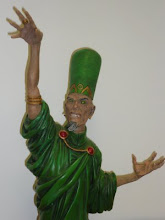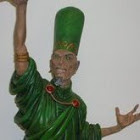 There are three versions of King John, the villainous prince in Robin Hood, the tyrant forced to sign the Magna Carta and the historical king. Stephen Church is interested in the historical King John, his life and context and this very engaging book gives King John his due.
There are three versions of King John, the villainous prince in Robin Hood, the tyrant forced to sign the Magna Carta and the historical king. Stephen Church is interested in the historical King John, his life and context and this very engaging book gives King John his due.John was the youngest son of Henry II and Eleanor of Aquitaine and was first called John Lackland as he really had no place in the succession to huge inheritance that Henry had assembled. This changed steadily as he came closer to to being a potential heir and so he joined his brothers in fighting his father. When Richard the Lionheart became king John had a strained relationship with him as well, finally after Richard's death John became king.
It was at this point that John's great weakness, that he was a truly terrible politician aligned with the unfortunate fact that he was faced with a fiercely determined enemy in Phillip Augustus, King of France who was determined to establish French control of Normandy and Brittany which were part of John's kingdom. It was John's losses in France that shaped most of the actions of his reign as he had to raise huge sums of money to carry out a war to recover his lost lands.
A great deal of the trouble he had in England arose from his efforts to get the money for his wars, made much harder by his lack of success in France. John was faced with a hugely determined opponent who had a home field advantage. John was an effective military commander, his expeditions in Ireland and Scotland and the various battles he had in England demonstrate this. The problem he had was that he could win a battle and fail to win the peace. In England, Ireland and France John never displayed any ability to created and nurture lasting and effective alliances with the major barons. He was unable and unwilling to court them and his innovative tax collections cut direct against their privileges.John also managed to have a serious fight with the Pope over the right to appoint the Archbishop of Canterbury, the leading churchman in the country. John was unfortunate in that Pope Innocent III was determined to actively assert papal privilege, John choose confrontation over finesse and he lost the struggle.
John inherited a wide ranging kingdom in England, Ireland, and France and manage to essentially lose everything and in the process alienate the two significant power structures of the society, the aristocracy and the Church. He lost his kingdom to the Pope and his political freedom to his barons with the Magna Carta. Stephen Church has written a book that rescues King John from myth and with telling detail and a sympathetic assessment of his character. John has been overshadowed by his father, mother, brother and son and deserves better. Stephen Church has done King John a great service and given the man a chance to stand beside the legend.


